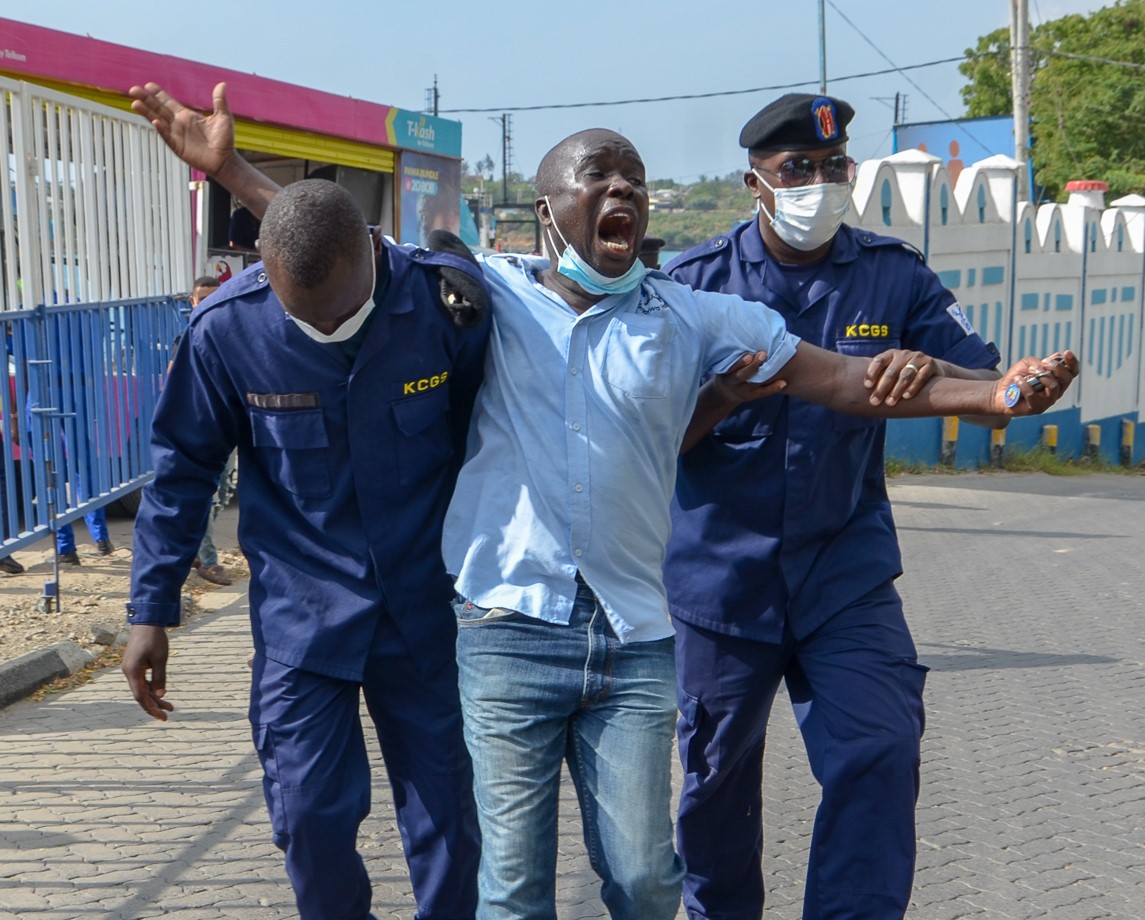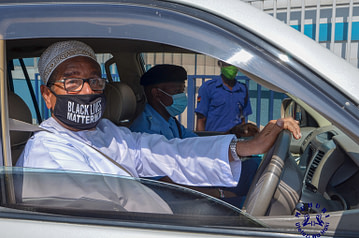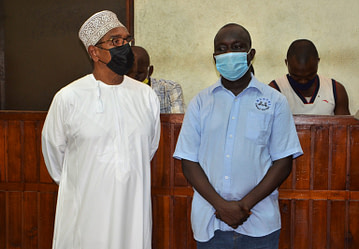Investigations
The Secret M-Pesa Deal By Kenya Ports And Safaricom That Has Landed MUHURI In Trouble

In October 2020, Kenya Ferry Services (KFS), a public entity, introduced a cashless system linked to Safaricom to collect tolls at the Likoni crossing channel.
KFS’ e-system automatically locked out ferry users not subscribed to Safaricom, especially motorists, motorbike riders and handcart pushers who must pay levies to cross the channel, a waterway connecting Mombasa island and the mainland side of Likoni.
KFS’ decision to force levy payment through Safaricom’s M-Pesa—a private mobile money transfer service—was unilateral and lacked public approval.
This secret deal has monopolized payment services at the public body in favour of a privately-owned telecommunication company. Safaricom’s private shares stand at 40 per cent—35 per cent owned by South Africa’s Vodacom and five per cent by British’s Vodafone. Kenya government controls a 35 per cent stake. There’s a 25 per cent free float.
The process to award Safaricom the deal remains unaccountable, opaque, and shrouded in secrecy, yet the company continues to rake in millions of shillings monthly. Safaricom earns a minimum of Sh8 and a maximum of about Sh100 per toll, depending on the size and weight of the vehicle crossing the Likoni channel. At least 6,000 motorists use the channel daily, KFS data shows. It means more than 816,000 crossings have occurred since KFS imposed the system on October 8, 2020. And this not to mention the numbers of motorbike riders and handcart pushers who have used the channel since.
KFS has kept the public in the dark about the deal’s details. The entity infringes on the right to access information, equality, consumer choice, and freedom from discrimination.
But despite Kenya having four mobile network operators, some with mobile money service like Safaricom, KFS continues to discriminate subscribers of other telcos–Airtel Kenya, Telkom Kenya, and Jamii Telecommunication Ltd.
MUHURI chairman Khelef Khalifa and rapid response officer Francis Auma protested urging structured public participation for a new inclusive system.
KFS has placed no remedy to cushion against the adverse effect of its e-system. Many non-M-Pesa ferry users are being turned away and denied crucial service. KFS is not taking hard currency.
Likoni channel remains the most preferred route between Mombasa island, a business hub, and the mainland side of Likoni, a mostly residential area. The Indian Ocean connects these areas by a 500-meter distance, making it the cheapest, fastest, and shortest course.
An alternative route, a road through Kwale town, is 30-kilometre-long and gobbles-up costly fuel than a toll across the Likoni channel. Further, the Sh28 billion Dongo Kundu bypass—under the second phase of construction as of January 28, 2021—will connect Mombasa island to Likoni by 17 kilometres.
MUHURI protests
KFS-Safaricom deal, effected on October 8, 2020, violated the rights of consumer equity services. It lacked public input, too. That month, MUHURI wrote to KFS urging a non-discriminatory e-payment system. KFS did not respond or act.
And on the morning of February 18, 2021, four months later, MUHURI chairman Khelef Khalifa and rapid response officer Francis Auma staged a peaceful protest at the channel’s island side. They called for the revocation of a discriminatory system. They urged structured public participation for a new inclusive system. Hundreds of motorists were in support.
KFS has kept the public in the dark about the deal’s details. The entity infringes on the right to access information, equality, consumer choice, and freedom from discrimination.
The demo led to their detention at Likoni Ferry police station and subsequent arraignment over trumped-up charges of causing disturbance and obstruction. A brutal response from security officers preceded this arrest.

Police arrest MUHURI chairman Khelef Khalifa (left) after he protested the M-Pesa-only charge at the Likoni channel on February 18. Photo: Ernest Cornel.
The pair got arraigned before magistrate Rita Amwayi on February 19, 2020, where the state prosecutor charged them with creating disturbance. But they denied it because they demonstrated peaceably and unarmed. Amwayi released each on Sh20,000 cash bail and set the hearing on May 4.

MUHURI chairman Khelef Khalifa and rapid response officer when they got arraigned on February 19. Photo: Ernest Cornel.
Second arrest
But police forcibly arrested the duo again, just under 30 seconds after the court freed them at 11:40 am. This arrest still arose from the peaceful demo at the Likoni channel, which wanted to overturn the discriminative e-payment system.
Cops pounced and shooed Khalifa and Auma from court corridors to the tent guarded by several detectives. The rearrest, an afront to their right to protest, attracted massive condemnation. Calls for police accountability raged.
The police arraigned them before Mombasa Resident Magistrate Christine Ogweno, and for the first time, revealed they faced an alleged traffic offence—causing an obstruction. Khalifa and Auima denied, and the court released each on Sh10,000 cash bail. The hearing is on March 9.

Police rearrest Auma and Khalifa on February 19. Photo: Ernest Cornel.
Kenya Insights allows guest blogging, if you want to be published on Kenya’s most authoritative and accurate blog, have an expose, news TIPS, story angles, human interest stories, drop us an email on [email protected] or via Telegram
-

 Grapevine1 week ago
Grapevine1 week agoAlleged Male Lover Claims His Life Is in Danger, Leaks Screenshots and Private Videos Linking SportPesa CEO Ronald Karauri
-

 Lifestyle1 week ago
Lifestyle1 week agoThe General’s Fall: From Barracks To Bankruptcy As Illness Ravages Karangi’s Memory And Empire
-

 Grapevine3 days ago
Grapevine3 days agoRussian Man’s Secret Sex Recordings Ignite Fury as Questions Mount Over Consent and Easy Pick-Ups in Nairobi
-

 Investigations2 weeks ago
Investigations2 weeks agoEpstein Files: Sultan bin Sulayem Bragged on His Closeness to President Uhuru Then His Firm DP World Controversially Won Port Construction in Kenya, Tanzania
-

 Business2 weeks ago
Business2 weeks agoKRA Can Now Tax Unexplained Bank Deposits
-

 Investigations1 week ago
Investigations1 week agoEpstein’s Girlfriend Ghislaine Maxwell Frequently Visited Kenya As Files Reveal Local Secret Links With The Underage Sex Trafficking Ring
-

 News1 week ago
News1 week agoState Agency Exposes Five Top Names Linked To Poor Building Approvals In Nairobi, Recommends Dismissal After City Hall Probe
-

 Business1 week ago
Business1 week agoM-Gas Pursues Carbon Credit Billions as Koko Networks Wreckage Exposes Market’s Dark Underbelly
















